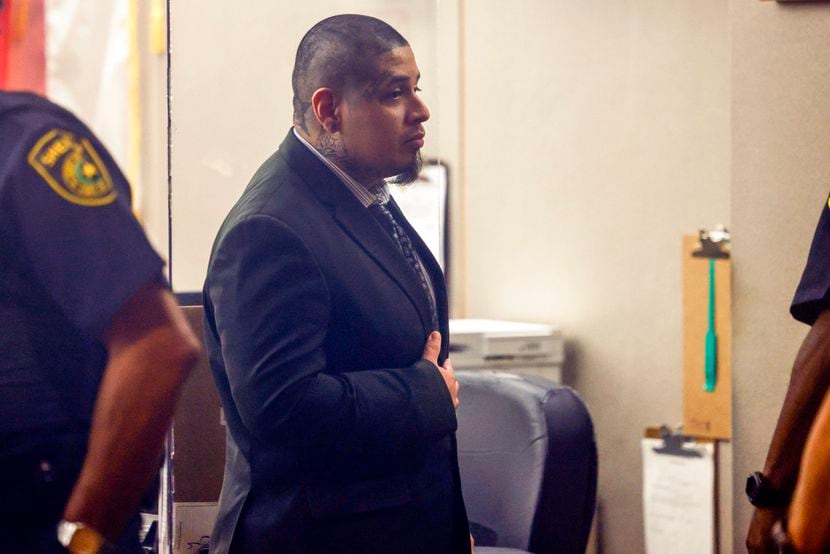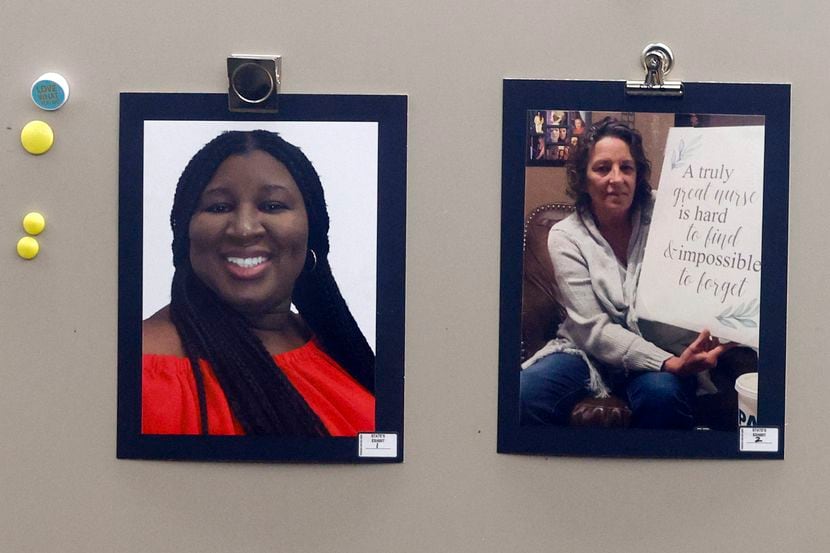The man who opened fire last year inside Methodist Dallas Medical Center, killing two medical workers, was found guilty of capital murder Thursday.
Nestor Hernandez, 31, was automatically sentenced to life in prison without the possibility of parole for fatally shooting nurse Katie Annette Flowers and social worker Jacqueline Pokuaa on Oct. 22, 2022, at the north Oak Cliff hospital. Dallas County prosecutors did not seek the death penalty.
Family and friends of Flowers jumped up from their courtroom gallery benches when state District Judge Chika Anyiam announced the unanimous verdict. They let out their bated breaths and whispered exclaims of “yes” and “it’s okay.” After the jury was dismissed, the family hugged and thanked prosecutors, including District Attorney John Creuzot.
In victim impact statements, Flowers’ three daughters, her niece and oldest granddaughter called Hernandez “disgusting,” “scum,” “a monster,” “loser” and a “waste of human space.” Boiling with anger and anguish from the witness box, they told him to “rot in hell” and lobbed insults at him, calling him short, fat and saying he had small, kid-sized feet; at times, others in the gallery clapped or snapped in support. Hernandez appeared to look at the women stoically as they spoke. He remained seemingly emotionless throughout the three-day trial, at times huddling with his attorneys or passing notes.

“The verdict was a relief,” Flowers’ youngest daughter, Kelly Flowers, told newspeople. “I am happy the jury saw through the BS and didn’t believe what he was obviously lying about.”
The jury — eight men and four women — deliberated for almost an hour and a half and asked to review police body-camera video and hospital surveillance footage of the shooting. Testimony in the high-profile trial ended Wednesday evening.
Hernandez testified in his own defense; Hernandez alleged the shooting was an accident, that he and his on-again, off-again girlfriend were fighting when the pistol misfired, killing Pokuaa. Flowers’ family called his account of what happened on the fourth-floor labor and delivery ward “bold-faced lies” and “blatant narcissism.”
Sarah Flowers, another of Katie Flowers’ four children, wore her mother’s cotton, teal nurses’ jacket; a red ribbon was pinned atop her shoulder — where the fatal bullet was recovered from Katie Flowers’ body. Others in the courtroom gallery wore navy blue, the color of the maternity unit nurses’ scrubs. Katie Flowers, 63, was a veteran healthcare worker who cared deeply about the mothers and babies she tended to.
Flowers’ family was appalled watching body-camera footage of Hernandez asking to call his mother while police wrapped a tourniquet around his leg and packed a bullet wound.
“We had to sit there and watch you cry for your mommy after we sat here and watched over and over again how you made sure we will never be able to do that again,” Sarah Flowers said.
In a letter read aloud by prosecutor George Lewis, Pokuaa’s family said they craved for justice in her death. Pokuaa’s brother was in the courthouse near downtown Dallas on the first day of testimony, but most of her family lives in Ghana, where she was born. Pokuaa, 45, was one of seven siblings, and mother to a 13-year-old.
“At the time this crime occurred I vowed to see that justice was done, and I am satisfied to say that’s what we’ve accomplished,” Creuzot said in a statement. He acknowledged that the verdict is “no replacement for these two innocent lives lost” but said it ensures Hernandez will die in prison.
To find him guilty of capital murder, the 12-person panel weighed whether Hernandez knowingly or intentionally killed the women. They were also asked to consider lesser charges of murder, manslaughter or criminally negligent homicide, which carry lighter sentences and are eligible for parole.
“We are disappointed in the verdict, but I can’t say it was entirely unexpected based on the facts of the case,” defense attorney Paul Johnson told The Dallas Morning News. “From the day it happened, it was pretty much an impossible case to defend. … It was up to the jury, and they made their decision.”
Johnson later said he believed Hernandez has expressed remorse for the slayings “in his own way.”
Hernandez, who had a history of robbery convictions and was on parole with an ankle monitor at the time of the shooting, was at the hospital to visit his girlfriend, Selena Villatoro. Villatoro had given birth the day before. She testified she gave him an ultimatum: ditch his black pistol or she wouldn’t give the baby his last name. Hernandez said he left the gun in her makeup bag.
Villatoro testified Hernandez became enraged, accused her of infidelity and pistol-whipped her. He then threatened to kill her, himself and anyone who came into the room, she said. Pokuaa, the social worker, went into Room 6 for routine patient care and Hernandez shot her in the back of her head, Villatoro said.

But on the witness stand, Hernandez said he and Villatoro were fighting when Pokuaa tried to intervene and the handgun misfired. In a panic, he then shot into the hallway, striking Flowers, before a Methodist police officer shot Hernandez in the upper thigh.
In closing arguments, DA Creuzot — who led jury selection for the prosecution and has been seated behind the attorneys throughout testimony — said Hernandez, masquerading as a doting new father, went to the hospital that day with “rage, resentment, anger.” He said Hernandez, who had methamphetamine in his blood and carried a beer to the maternity wing, was on a “mission to kill.”
“The plan,” Creuzot said, “was to wreak chaos and kill.”
Lewis, the prosecutor, said the women’s injuries and unused bullets found in the hospital room proved Hernandez acted deliberately. He was motivated by his beliefs that Villatoro cheated on him; that he wasn’t the baby’s father; and that she’d given him a sexually transmitted disease, Lewis said. During testimony, prosecutors presented a paternity test showing Hernandez was the newborn’s father.
Lewis, in his impassioned argument, called Hernandez a coward.
Defense attorneys conceded in their closing statements that Hernandez did open fire but didn’t intend to kill anyone. They then asked jurors to consider the lesser charges.
Johnson said Hernandez and Villatoro were in a fraught relationship and she was using their son’s last name and birth certificate as leverage over Hernandez. The fight, Johnson said, grew out of control, escalated by Villatoro, when the gun went off, almost instantly killing Pokuaa.
Johnson asked the jury to rule in favor of “justice and not revenge.” The jurors nodded along and some pursed their lips as the lawyers spoke.
Closing arguments were delayed by a few hours Thursday morning because one of the jurors was late to court. Creuzot asked the judge, Anyiam, to dismiss the juror, alleging he seemed confused and smelled of alcohol. Anyiam briefly questioned the juror before allowing him to stay on the panel.
Hernandez was released from prison in 2021 after serving 80% of an eight-year sentence for aggravated robbery, according to the Texas Board of Pardons and Paroles. He violated parole twice before the shooting by breaking curfew and cutting off his ankle monitor.
Hernandez’s parole terms were heavily criticized by officials, who denounced ankle monitors as a form of accountability and called out lapses in oversight of the state’s parole process. In direct response to the shooting, Gov. Greg Abbott signed legislation into law this spring that makes it so parolees or people out on bond face a felony charge if they knowingly remove or disable their ankle monitor. Before the law went into effect, tampering with an ankle monitor was an administrative violation, not a criminal offense.
This post was originally published on this site be sure to check out more of their content.








